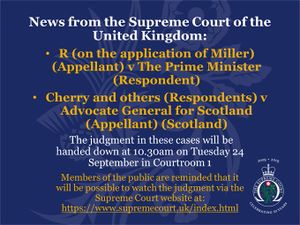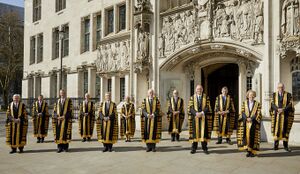Difference between revisions of "UK/Supreme Court"
m (→Full Judgment) |
m |
||
| (One intermediate revision by the same user not shown) | |||
| Line 5: | Line 5: | ||
|constitutes=Court | |constitutes=Court | ||
|wikipedia=https://en.wikipedia.org/wiki/Supreme_Court_of_the_United_Kingdom | |wikipedia=https://en.wikipedia.org/wiki/Supreme_Court_of_the_United_Kingdom | ||
| + | |twitter=https://twitter.com/UKSupremeCourt | ||
}} | }} | ||
| − | The '''UK/Supreme Court''' (UKSC) is the final court of appeal in the [[United Kingdom]] for civil cases, and for criminal cases from [[England]], [[Wales]] and [[Northern Ireland]]. The UKSC hears cases of the greatest public or constitutional importance affecting the whole population.<ref> | + | The '''UK/Supreme Court''' (UKSC) is the final court of appeal in the [[United Kingdom]] for civil cases, and for criminal cases from [[England]], [[Wales]] and [[Northern Ireland]]. The UKSC hears cases of the greatest public or constitutional importance affecting the whole population.<ref>''[https://www.supremecourt.uk/ "The Supreme Court"]''</ref> |
| − | As authorised by the Constitutional Reform Act 2005, Part 3, Section 23(1) and s. 23, the UKSC was formally established on 1 October 2009, and assumed the judicial functions of the [[House of Lords]], which had been exercised by the Lords of Appeal in Ordinary (commonly called "Law Lords"), the 12 judges appointed as members of the [[House of Lords]] to carry out its judicial business as the Appellate Committee of the House of Lords. | + | As authorised by the Constitutional Reform Act 2005, Part 3, Section 23(1) and s. 23, the [[UKSC]] was formally established on 1 October 2009, and assumed the judicial functions of the [[House of Lords]], which had been exercised by the Lords of Appeal in Ordinary (commonly called "Law Lords"), the 12 judges appointed as members of the [[House of Lords]] to carry out its judicial business as the Appellate Committee of the House of Lords. |
| − | The UKSC's jurisdiction over devolution matters had previously been exercised by the Judicial Committee of the [[Privy Council]]. | + | The [[UKSC]]'s jurisdiction over devolution matters had previously been exercised by the Judicial Committee of the [[Privy Council]]. |
==Current Judges== | ==Current Judges== | ||
| − | [[File: | + | [[File:UKSC_Judges.jpg|300px|right|thumb|Twelve Justices of the UK Supreme Court]] |
| − | There are 12 Judges of the UK Supreme Court | + | There are 12 Judges of the UK Supreme Court: |
| − | * | + | *[[Lord Reed]] (President) |
| − | *[[Lord | + | *[[Lord Hodge]] (Deputy President) |
| − | + | *[[Lady Arden]] of Heswall | |
| − | |||
| − | |||
| − | |||
| − | *[[Lady | ||
| − | |||
*[[Lord Briggs]] of Westbourne | *[[Lord Briggs]] of Westbourne | ||
| − | *[[ | + | *[[Lord Burrows]] |
| + | *[[Lord Hamblen]] of Kersey | ||
*[[Lord Kitchin]] | *[[Lord Kitchin]] | ||
| + | *[[Lord Leggatt]] | ||
| + | *[[Lord Lloyd-Jones]] | ||
| + | *[[Lady Rose]] of Colmworth | ||
*[[Lord Sales]] | *[[Lord Sales]] | ||
| − | + | *[[Lord Stephens]] of Creevyloughgare<ref>''[https://www.supremecourt.uk/news/lord-reed-appointed-next-president-of-supreme-court-alongside-three-new-justices.html "Lord Reed appointed next President of Supreme Court, alongside three new justices"]''</ref> | |
| − | |||
| − | |||
| − | |||
| − | *[[Lord | ||
| − | |||
| − | |||
| − | |||
==Parliament's prorogation "unlawful"== | ==Parliament's prorogation "unlawful"== | ||
Latest revision as of 23:20, 30 April 2021
(Court) | |
|---|---|
 | |
| Parent organization | UK, UK/Ministry of Justice |
The UK/Supreme Court (UKSC) is the final court of appeal in the United Kingdom for civil cases, and for criminal cases from England, Wales and Northern Ireland. The UKSC hears cases of the greatest public or constitutional importance affecting the whole population.[1]
As authorised by the Constitutional Reform Act 2005, Part 3, Section 23(1) and s. 23, the UKSC was formally established on 1 October 2009, and assumed the judicial functions of the House of Lords, which had been exercised by the Lords of Appeal in Ordinary (commonly called "Law Lords"), the 12 judges appointed as members of the House of Lords to carry out its judicial business as the Appellate Committee of the House of Lords.
The UKSC's jurisdiction over devolution matters had previously been exercised by the Judicial Committee of the Privy Council.
Contents
Current Judges
There are 12 Judges of the UK Supreme Court:
- Lord Reed (President)
- Lord Hodge (Deputy President)
- Lady Arden of Heswall
- Lord Briggs of Westbourne
- Lord Burrows
- Lord Hamblen of Kersey
- Lord Kitchin
- Lord Leggatt
- Lord Lloyd-Jones
- Lady Rose of Colmworth
- Lord Sales
- Lord Stephens of Creevyloughgare[2]
Parliament's prorogation "unlawful"

From 17 to 19 September 2019, eleven Supreme Court justices heard challenges to the legality of Boris Johnson's decision to suspend parliament for five weeks. The Supreme Court was summoned for this emergency hearing outside legal term-time after the Scottish appeal court unanimously allowed the prorogation challenge.[3]
President of the Supreme Court, Baroness Hale, summarised the Court's unaninmous Judgment on Tuesday 24 September 2019, which concluded:[4]
- "This Court has already concluded that the Prime Minister’s advice to Her Majesty was unlawful, void and of no effect. This means that the Order in Council to which it led was also unlawful, void and of no effect and should be quashed. This means that when the Royal Commissioners walked into the House of Lords it was as if they walked in with a blank sheet of paper. The prorogation was also void and of no effect. Parliament has not been prorogued. This is the unanimous Judgment of all 11 Justices.
- "It is for Parliament, and in particular the Speaker and the Lord Speaker to decide what to do next. Unless there is some Parliamentary rule of which we are unaware, they can take immediate steps to enable each House to meet as soon as possible. It is not clear to us that any step is needed from the Prime Minister, but if it is, the court is pleased that his counsel have told the court that he will take all necessary steps to comply with the terms of any declaration made by this Court. It follows that the Advocate General’s appeal in the case of Cherry is dismissed and Mrs Miller’s appeal is allowed. The same declarations and orders should be made in each case."[5]
Full Judgment
The 24-page Judgment on the cases
- R (on the application of Miller) (Appellant) v The Prime Minister (Respondent); and,
- Cherry and others (Respondents) v Advocate General for Scotland (Appellant) (Scotland)
Related Documents
References
Wikipedia is not affiliated with Wikispooks. Original page source here
